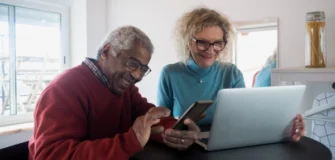Government secures digital identity verification
Share

In an address to the National Press Club in Canberra, the Minister for Government Services, Bill Shorten, announced the Albanese government is developing ‘brand new and world-leading’ digital infrastructure.
‘Trust Exchange’ would give Australians the ability to verify their identity and credentials without ever handing over superfluous personal information and sometimes without exchanging any personal information at all.
Minister Shorten said Trust Exchange, or TEx, is in the ‘proof of concept’ stage and involves other departments, including the Minister for the Public Service, Senator Katy Gallagher, and Assistant Treasurer, Stephen Jones.
Working via the digital wallets of their choice, individuals would use TEx to verify their identity and their credentials based on official information already held by the Australian Government.
“The technology behind TEx would take all the hassle out of finding dozens of documents to prove who you are when you’re doing things like setting up a bank account, buying a mobile phone, or even trying to rent a property,” Minister Shorten said.
“TEX will connect the bank, telco, or real estate agent with your digital wallet, and you then consent to sharing only the identity attributes or credentials you choose.”
In the case of someone going to the local pub and wanting to prove they’re 18, TEx technology would mean no personal information is exchanged at all.
The person would just need to hold their phone up to a QR code or tap, like we do when we make a purchase with our smart phone, and have a digital token sent to the club vouching for their identity and age.
It’s a digital ‘thumbs up’ from the Australian Government that the person in front of them is who they say they are.
And while the token is of high value to the business, it would be of no value to a hacker because it contains no personal information.
In discussions with my office, Telstra and Google welcomed the opportunity to be involved in the development of TEx. The Commonwealth Bank and employment platform, SEEK, have given in-principle support for the technology.
The Tech Council supports the announcement of this significant piece of digital infrastructure and acknowledges the Albanese government’s commitment to data security.
The possibilities of TEx are endless.
This is the way it works.
- You need a service—renting a hotel room, for example.
- When you check in, the hotel requests your personal information (attributes)—usually your driver’s licence or passport.
- With TEx, instead of handing over those documents and having them taken to the back office to be photocopied, you will scan a QR code on the front desk—or use technology similar to the tap-to-pay machine—which digitally shakes hands with your MyGov wallet.
- You choose which information to share from your digital wallet and consent to its use.
- You will have a record in your MyGov wallet of what you shared and with whom you shared it.
So, this means Trust Exchange delivers three benefits:
- Consent: You consent every time your information is shared.
- Choice: You choose what information is shared, by whom, and to whom.
- Trust: the information shared is trusted because the system imposes rigors privacy and security standards to validate its authenticity.
The TEx proof-of-concept phase is expected to be completed by the end of 2024, with options for the pilot phase to be considered in early 2025.
Public Spectrum is the first knowledge-sharing platform in Australia to embrace the entire public sector. This website is a platform where you can connect, collaborate, empower, inspire, and upskill with public sector professionals.










Today’s Pick
11th Annual Aus Goverment Data Summit
April 1, 2025
7th Annual NZ Government Data Summit
May 7, 2025
3rd Public Sector Comms Week
May 14, 2025
Subscribe
We send emails,
but we do not spam
Join our mailing list to be on the front lines of healthcare , get exclusive content, and promos.
AI appointment Australia Australian boost boosts business businesses covid-19 cyber cyber attack cybersecurity cyber security data data breach data management defence Digital employment enhance enhances fraud funding governance government grants infrastructure Innovation Lockdown management new zealand NSW NZ online privacy public Public Sector queensland renewable energy scams security Social Media Technology telecommunications victoria
-

Understanding and building your digital strategy
Digital Government, Opinion
-

Featured Leader: Jamie Morse on multi-channel strategies for communication
Communications, Featured Leader
-

Featured Leader: Tegan Tembe of NSW Treasury on creating solid planning strategies and processes
Featured Leader
-

Wirraka Maya Health Service improves patient care with My Health Record
Learning
Show More-

Effects of ineffective communication in the workplace
Communications, Personal Development
-

7 ways you can enhance your personal development skills
News, Personal Development
-

5 advantages of working in the public sector
News, Personal Development, Professional Development
-

7 causes of communication issues in the workplace
Communications, News, Personal Development
Show MoreLast Viewed